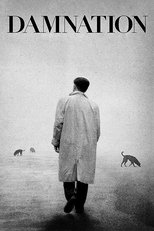CinemaSerf
Aug 17, 2024
7/10
In a town that is quite possibly the wettest place on Earth, the permanently raincoat-clad "Karrer" (Miklós Székely B) goes through the motions with a life that is little more animated than his dreich surroundings. What sustains him through the grand ennui of his existence is his love for the married singer in the gloomy "Titanik" bar (Vali Kerekes) for whom he declares, repeatedly, his undying love and for whose husband "Willarsky" (Gyula Pauer) he has little but contempt. Luckily for him, though, the guy is in almost permanent debt so is away frequently enough for the two to indulge their relationship, infatuation, addiction now and again. That's about the height of it. Can this ever decreasing circle ever change? What's quite intriguing about this cinematic festival of monochrome melancholia is that the story is almost irrelevant to what Béla Tarr seems to be offering us here. The photography is dank and dreary, the constant tracking shots, panning shots, lingering close ups of the rain dripping from branches or the faces of the customers in the bar - none of those actually do anything to support the plot, but they add a delicious richness to the whole allure of this film. There's a song - almost as depressing as the weather, completed by a gentle saxophonist that I felt rather summed up the whole ambiance of this glacially paced exercise in bleakness. I'm no film critic and am not in a position to write some extensive exposition on what motivated the director or how original his techniques at story telling are, I can only judge what was put before me for two hours and though, yes, at times it is downright dull, at other times it was a bit like wandering through an art gallery where the light (or shade) brought something out of the blandness of the scenario. It won't be for everyone as there really isn't that much actually happening, the dialogue is pretty sparse and the repetitive nature of the plot development might be risky for an audience required to focus for a couple of hours where the sight and sound of constant rain might just start to feel like a drip on your head. I'm not sure I'd ever watch it again - but as an exercise in epitomising the depressiveness of the routine, the hopeless and the pedestrianism of daily life, it's worth a watch. You probably ought to watch it in a cinema, though - at home on a television it will lose much of it's photographic distinction and you might just be tempted to hit fast-forward now and again.
